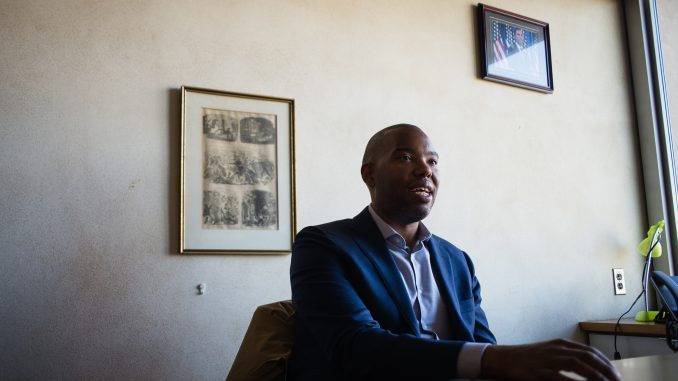
Ta-Nehisi Coates, a national correspondent for The Atlantic, visited Temple in October and started a campus-wide conversation about plunder.
Benjamin Talton, a history professor at Temple and friend of Coates from their time at Howard University, invited the journalist to speak at the university.
According to the Oxford Dictionary, plunder is stealing goods from a place or person, but Talton defines plunder on a much deeper level.
“Plunder is very similar to theft, but it is more than just stealing materials,” Talton said. “You strip someone of humanity and you take from them a sense of being when you plunder them.”
“Coates’ critical thinking inspired us to start thinking about the theme of plunder,” said Bryant Simon, who is also a history professor.
During an informal conversation at a meeting of history professors in Fall 2015, Talton suggested the theme for future programming. Since then, he has worked with Simon to develop a series of courses and events on the topic.
In Coates’ public lecture in the Liacouras Center, “A Deeper Black: Race in America,” he spoke about the plunder of the Black body in American history.
Coates’ book, “Between the World and Me,” reflects his work addressing racial injustice in America. In articles like “The Case for Reparations” and “The Enduring Solidarity of Whiteness” — both published in The Atlantic — he discussed plunder of African Americans.
Coates asked the audience a question during his talk: “What is the relationship of the university to the community?”
“This is a huge issue,” Talton said. “We first need to ask ourselves, how did this community get this way, then we need to address the problem and fix it.”
By raising awareness of plunder, Talton thinks that the university may better understand the community and be more sensitive.
“Coates is not wrong,” Simon said. “Plunder is about race, but there are other ways to frame it in order to start a broader conversation.”
With this program, Talton and Simon have invited professors from other departments to incorporate the idea of plunder into their classes and to have an open discussion with their students about how it affects their studies at Temple.
“We wanted to start thinking about the collateral damage that comes with the advancement of society,” Talton said. “How are people affected? How are they plundered?”
Classes like World Economy since 1945, 20th Century American Drug Wars, Seminar on Plunder: A.O. Scott’s Top Plunder Films and several other courses will be offered in Spring 2017 in the history department and the School of Theater, Film and Media Arts.
“Essentially what we have done is given the subject of plunder to a host of professors and asked them, ‘what will you do with this?’” Talton said.
“Students that put the most into classes like these will get from them a much more involved conversation,” Simon said.
Next semester, A.O. Scott, an author and chief movie critic at the New York Times, will speak at Temple.
Scott will work with the plunder classes within TFMA. He has worked in collaboration with Talton and Bryant to suggest and develop a list of films that explore plunder.
Students who choose to take a plunder course in the film and media arts department can watch a film about the topic each week.
The idea of a themed semester is one that Simon believes can be exposed to the whole university. He hopes the programming can be used as a template for further discussions on various topics like food or religion.
The Intellectual Heritage department also plans to devote their spring semester theme to issues related to Coates’ book, going off the current theme of race, but more focused on social justice and civic engagement, said Douglas Greenfield, the associate director of IH.
“The discussion part is key,” Talton said. “It would be nice to develop an intellectual conversation and a sense of community throughout the university.”
Patrick Bilow can be reached at patrick.timothy.bilow@temple.edu.


Be the first to comment